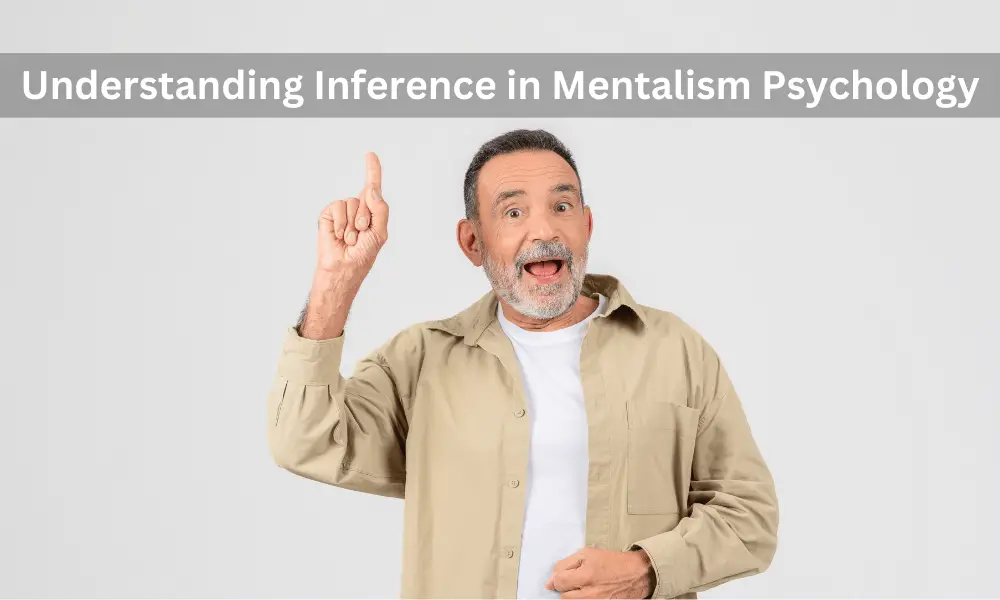
How mentalists read minds using inference in mentalism psychology is to use subtle body landguage and speech cues, such that the person has no idea they are being “read”.
, performers captivate audiences by appearing to read minds or predict thoughts. A key technique behind these feats is inference, which involves deducing information based on subtle cues and observations.
How Mentalists Use Clues to Read Minds with Inference in Mentalism
Inference in mentalism psychology is the art of deducing people’s thoughts with subtle observation like body language, speech patterns and context. Rooted in psychology of the mind it lets mentalists appear to read minds to create captivating illusions with skillful observation and educated guesses.
What is Inference in Mentalism?
Inference in mentalism is the psychological process of drawing conclusions from available information. In mentalism, it refers to the ability to extract a person’s thoughts or knowledge by interpreting their behaviour, body language, speech patterns, and other subtle cues.
Of course, this is done without the person realising they are being tricked by the mentalist.
How Do Mentalists Use Inference?
Mentalists employ inference by:
- Observing Non-Verbal Cues: They notice facial expressions, gestures, and posture to gain insights into a person’s thoughts or feelings. With amazing affect.
- Analyzing Speech Patterns: Listening for hesitations, tone changes, or specific word choices that may reveal underlying thoughts.
- Understanding Context: Considering the environment and situation to make educated guesses about what someone might be thinking.
Inference in mentalism psychology can be learned, but once learned it will require practice to perfect the art. If you’re interested to learn mentalism and inference, this diploma course on Mentalism includes the art of inference.
Example of Inference in Mentalism
Imagine a mentalist asks someone to think of a number between one and ten.
By observing the person’s immediate reactions—such as a brief smile, eye movement, or slight nod—the mentalist might infer the pereson’s chosen number without any verbal confirmation from that person. But this takes practice, and being very observant and to read cues, like body language.
The Role of Psychology in Inference
Inference in mentalism is deeply rooted in psychological principles.
Inference is about understanding human behaviour, and people’s cognitive biases combined with social cues to enable mentalists to make accurate deductions. This knowledge allows them to create the illusion of mind reading by interpreting observable data that others might overlook.
Learning Inference Techniques
For those interested in mastering mentalism, learning inference techniques is essential. Courses like the Mentalism Diploma Course offer structured lessons on:
- Developing Observational Skills: Training to notice and interpret subtle cues.
- Understanding Human Behavior: Studying psychological theories related to thought processes and decision-making.
- Practicing Ethical Considerations: Learning to use inference responsibly and respectfully.
The full mentalism course modules include the following:
- Beginning to Read Minds – includes “What is Mentalism” and the building blocks.
- Insinuation – includes “What is Insinuation?”.
- Inference – includes “What is Inference?”.
- Readings – includes “What is Reading?”.
- Contact Mind Reading – includes “What is Contact Mind Reading?”.
- Lying and Lie Detection – includes “Lying and Mentalism“.
- Practical Influence – includes “Cognitive Bias” & “Psychological Forces“.
- Memory – includes “Why we forget” & “Memory Systems“.
- Suggestion – includes “What is Suggestion?” & “Performing Suggestion“.
- Mentalism for the Self – includes “Regaining Control“.
Find out more about this Diploma Course in Mentalism.
By honing these skills, aspiring mentalists can enhance their performances and create more convincing illusions of mind reading and thought prediction.
In conclusion, inference in mentalism psycology is a fundamental aspect of mentalism that relies on psychological insights to deduce information.
Through careful and skilful observation and analysis, mentalists can create astonishing effects that captivate and intrigue audiences.
I hope you enjoyed this article about Understanding Inference in Mentalism Psychology
I’d love to hear from you. Tell us about your journey to become a performing mentalist or magician (or both). Please comment below. Please also share your experiences, both good and bad.!
If this article hasn’t answered all of your questions. If you have more questions either about mentalism or magic, I will try to answer them (or specifically about Understanding Inference in Mentalism Psychology), please comment below with your questions.
There will also be many more articles about mentalism for you to read and learn about this fantastic skill.
